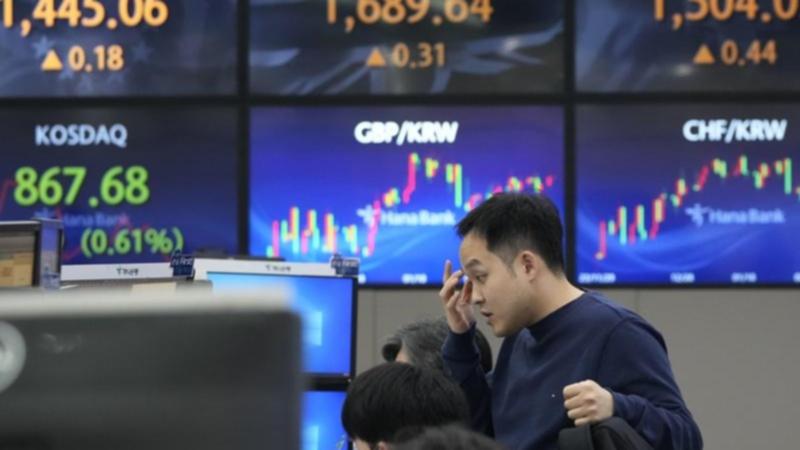Wall Street slips as investors brace for inflation data
US stocks have opened by dipping after mixed jobs reports, with tech stocks leading losses.

Wall Street’s main stock indexes have dipped, as investors awaited key inflation data this week that could provide cues on the US Federal Reserve’s monetary policy path after a mixed jobs report last week.
All three major US stock indexes had ended the week lower on Friday, with the S&P 500 and Nasdaq coming off record highs as high-flying chip stocks fell and a labour market report showed more new jobs than expected, while the unemployment rate rose unexpectedly.
The mixed report bolstered bets of the Fed cutting interest rates in June. Friday’s data even prompted some traders to bet on a May rate cut.
Sign up to The Nightly's newsletters.
Get the first look at the digital newspaper, curated daily stories and breaking headlines delivered to your inbox.
By continuing you agree to our Terms and Privacy Policy.This week’s February data, including consumer prices (CPI), will offer more clues on whether inflation has eased enough for policymakers to lower borrowing costs in the coming months.
“I would expect a hotter number to drive the market down unnecessarily,” said Peter Andersen, founder of Andersen Capital Management in Boston.
“Though there is still a narrative that the Fed will cut rates as soon as possible.”
Sticky inflation data for January and signs of a robust economy halted the AI-led rally last month, leading traders to push back bets on the timing of the first interest-rate cut to June from March.
Federal Reserve officials are in a media blackout ahead of their latest rate-setting meeting next week.
In early morning trading, the Dow Jones Industrial Average was down 75.72 points, or 0.20 per cent, at 38,646.97, the S&P 500 was down 9.74 points, or 0.19 per cent, at 5,113.95, and the Nasdaq Composite was down 21.81 points, or 0.14 per cent, at 16,063.31.
Information technology led losses across the major S&P 500 sectors, down 0.4 per cent, while communication services fell 0.2 per cent.
Megacap stocks such as Microsoft and Amazon.com eased 0.8 per cent and 1.0 per cent, respectively, and were among the biggest weights on the S&P 500.
AI-darling Nvidia fell 0.7 per cent in volatile trading following a 5.5 per cent drop on Friday, as chip stocks lost some momentum.
Chip peers Advanced Micro Devices and Broadcom slid close to 2 per cent each, while the Philadelphia Semiconductor Index lost 1.3 per cent after touching record highs last week.
Boeing fell 2.2 per cent after Alaska Airlines said on Saturday it was cooperating with the US Department of Justice in a criminal investigation into a Boeing 737 MAX blowout on one of its flights in January.
Cryptocurrency and blockchain-related firms, including Coinbase Global, Riot Platforms and Marathon Digital, climbed between 2.7 per cent and 2.9 per cent, as bitcoin hit a fresh record high.
Equitrans Midstream rose 1.8 per cent after EQT Corp said on Monday it had decided to buy back its former unit in an all-stock deal. EQT shares slid 9.8 per cent.
The 2024 US presidential election is also coming into focus, with investors bracing for a likely rematch between President Joe Biden and former President Donald Trump.
Declining issues outnumbered advancers for a 1.08-to-1 ratio on the NYSE. Advancing issues outnumbered decliners by a 1.11-to-1 ratio on the Nasdaq.
The S&P index recorded nine new 52-week highs and no new lows, while the Nasdaq recorded 26 new highs and 22 new lows.
